- Clone
- A2A9/6 (See other available formats)
- Regulatory Status
- RUO
- Other Names
- gpIIb/gpIIIa
- Isotype
- Mouse IgG2a, κ
- Ave. Rating
- Submit a Review
- Product Citations
- publications
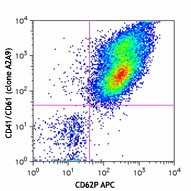
-

Thrombin-activated human peripheral blood platelets were stained with mouse IgG1 anti-CD62P APC and purified CD41/CD61 (clone A2A9/6) (top) or purified mouse IgG2a, κ isotype control (bottom), followed by anti-mouse IgG2a PE. -

| Cat # | Size | Price | Quantity Check Availability | Save | ||
|---|---|---|---|---|---|---|
| 359804 | 500 µg | 325 CHF | ||||
CD41/CD61, also known as gpIIb/IIIa, is a member of a family integrin receptors. This is a complex comprised by CD41 and CD61 through non-covalent association. CD41/CD61 is mainly expressed by platelets and megakaryocytes. The resting form of the CD41/CD61 complex is involved in platelet activation and aggregation by binding to immobilized fibrinogen. After activation, CD41/CD61 becomes a receptor for soluble fibrinogen and several other RGD-containing adhesive proteins such as von Willebrand Factor (vWF) and fibronectin. An absence or dysfunction of CD41/CD61 on the platelet surface results in an inherited bleeding disorder, called Glanzmann Thromsasthenia (GT). CD41/CD61 has been found on murine hematopoietic progenitor cells, indicating that this complex may play a role in regulating hematopoietic development.
Product DetailsProduct Details
- Verified Reactivity
- Human
- Antibody Type
- Monoclonal
- Host Species
- Mouse
- Immunogen
- Human platelets
- Formulation
- 0.2 µm filtered in phosphate-buffered solution, pH 7.2, containing no preservative.
- Endotoxin Level
- Less than 0.01 EU/µg of the protein (< 0.001 ng/µg of the protein) as determined by the LAL test.
- Preparation
- The Ultra-LEAF™ (Low Endotoxin, Azide-Free) antibody was purified by affinity chromatography.
- Concentration
- The antibody is bottled at the concentration indicated on the vial, typically between 2 mg/mL and 3 mg/mL. Older lots may have also been bottled at 1 mg/mL. To obtain lot-specific concentration and expiration, please enter the lot number in our Certificate of Analysis online tool.
- Storage & Handling
- The antibody solution should be stored undiluted between 2°C and 8°C. This Ultra-LEAF™ solution contains no preservative; handle under aseptic conditions.
- Application
-
FC - Quality tested
Block, IP - Reported in the literature, not verified in house - Recommended Usage
-
Each lot of this antibody is quality control tested by immunofluorescent staining with flow cytometric analysis. For flow cytometric staining, the suggested use of this reagent is ≤1.0 µg per million cells in 100 µl volume or 100 µl of whole blood. It is recommended that the reagent be titrated for optimal performance for each application.
- Application Notes
-
Additional reported applications (for relevant formats) include: immunoprecipitation1 and blocking (aggregation)2. The Ultra-LEAF™ purified antibody (Endotoxin <0.01 EU/μg, Azide-Free, 0.2 μm filtered) is recommended for functional assays (Cat. No. 359804).
A2A9/6 is recognized as having high affinity to gpIIb/IIIa. It has been shown to inhibit platelet aggregation induced by a variety of agonists and the initiation of clot formation. -
Application References
(PubMed link indicates BioLegend citation) -
- Basani RB, et al. 1996. Blood. 88:167. (IP)
- Bennett JS, et al. 1983. Proc. Natl. Acad. Sci. USA. 80:2417. (Block)
- Product Citations
-
- RRID
-
AB_2562484 (BioLegend Cat. No. 359804)
Antigen Details
- Structure
- Complex of CD41 and CD61 through non-covalent association.
- Distribution
-
Platelets and megakaryocytes.
- Function
- Mediates attachment to cells of diverse matrix proteins.
- Ligand/Receptor
- Fibrinogen, RGD-containing adhesive proteins such as vonWillebrand Factor (vWF) and fibronectin.
- Cell Type
- Megakaryocytes, Platelets
- Biology Area
- Cell Adhesion, Cell Biology, Immunology
- Molecular Family
- Adhesion Molecules, CD Molecules
- Antigen References
-
1. Matsumura-Takeda K, et al. 2007. Stem Cell. 25:862.
2. Corbel C, et al. 2005. 49:279.
3. Bennett JS, et al. 1983. Proc. Natl. Acad. Sci. USA. 80:2417.
4. Clemetson KJ, et al. 1994. Curr. Opin. Hematol. 1:388. - Gene ID
- 3690 View all products for this Gene ID 3674 View all products for this Gene ID
- UniProt
- View information about CD41/CD61 on UniProt.org
Related Pages & Pathways
Pages
Related FAQs
- Do you guarantee that your antibodies are totally pathogen free?
-
BioLegend does not test for pathogens in-house aside from the GoInVivo™ product line. However, upon request, this can be tested on a custom basis with an outside, independent laboratory.
- Does BioLegend test each Ultra-LEAF™ antibody by functional assay?
-
No, BioLegend does not test Ultra-LEAF™ antibodies by functional assays unless otherwise indicated. Due to the possible complexities and variations of uses of biofunctional antibodies in different assays and because of the large product portfolio, BioLegend does not currently perform functional assays as a routine QC for the antibodies. However, we do provide references in which the antibodies were used for functional assays and we do perform QC to verify the specificity and quality of the antibody based on our strict specification criteria.
- Does BioLegend test each Ultra-LEAF™ antibody for potential pathogens?
-
No, BioLegend does not test for pathogens in-house unless otherwise indicated. However, we can recommend an outside vendor to perform this testing as needed.
- Have you tested this Ultra-LEAF™ antibody for in vivo or in vitro applications?
-
We don't test our antibodies for in vivo or in vitro applications unless otherwise indicated. Depending on the product, the TDS may describe literature supporting usage of a particular product for bioassay. It may be best to further consult the literature to find clone specific information.
Other Formats
View All CD41/CD61 Reagents Request Custom Conjugation| Description | Clone | Applications |
|---|---|---|
| Purified anti-human CD41/CD61 | A2A9/6 | FC,IP |
| Ultra-LEAF™ Purified anti-human CD41/CD61 | A2A9/6 | FC,Block,IP |
| PE anti-human CD41/CD61 | A2A9/6 | FC |
| APC anti-human CD41/CD61 | A2A9/6 | FC |
| FITC anti-human CD41/CD61 | A2A9/6 | FC |
| PE/Cyanine7 anti-human CD41/CD61 | A2A9/6 | FC |
| PerCP/Cyanine5.5 anti-human CD41/CD61 | A2A9/6 | FC |
| PE/Dazzle™ 594 anti-human CD41/CD61 | A2A9/6 | FC |
| APC/Fire™ 750 anti-human CD41/CD61 | A2A9/6 | FC |
Customers Also Purchased
Compare Data Across All Formats
This data display is provided for general comparisons between formats.
Your actual data may vary due to variations in samples, target cells, instruments and their settings, staining conditions, and other factors.
If you need assistance with selecting the best format contact our expert technical support team.
-
Purified anti-human CD41/CD61
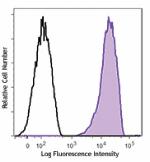
Thrombin-activated human platelets were stained with purifie... -
Ultra-LEAF™ Purified anti-human CD41/CD61
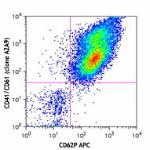
Thrombin-activated human peripheral blood platelets were sta... 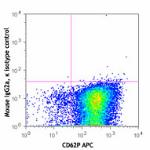
-
PE anti-human CD41/CD61
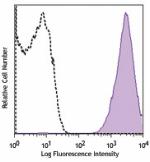
Human peripheral blood platelets were stained with CD41/CD61... -
APC anti-human CD41/CD61
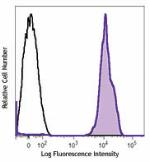
Human platelets were stained with anti-human CD41/CD61 (clon... -
FITC anti-human CD41/CD61
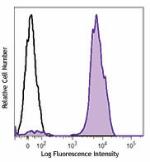
Human platelets were stained with anti-human CD41/CD61 (clon... -
PE/Cyanine7 anti-human CD41/CD61
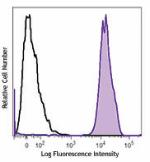
Human platelets were stained with anti-human CD41/CD61 (clon... -
PerCP/Cyanine5.5 anti-human CD41/CD61
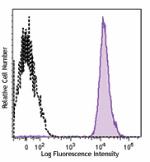
Human platelets were stained with CD41/CD61 (clone A2A9/6) P... -
PE/Dazzle™ 594 anti-human CD41/CD61
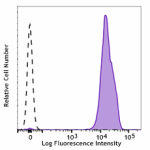
Human platelets were stained with CD41/CD61 (clone A2A9/6) P... -
APC/Fire™ 750 anti-human CD41/CD61
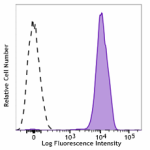
Human platelets were stained with CD41/CD61 (clone A2A9/6) A...

 Login / Register
Login / Register 







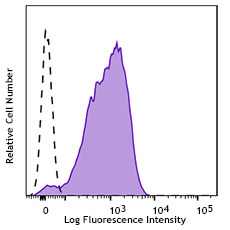
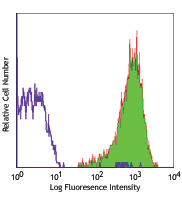



Follow Us